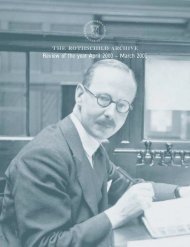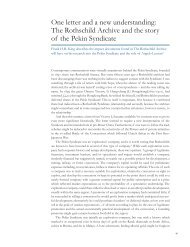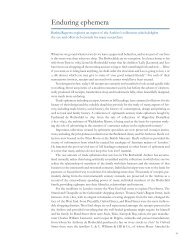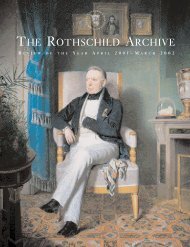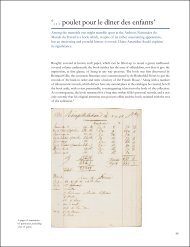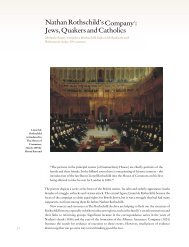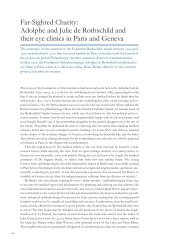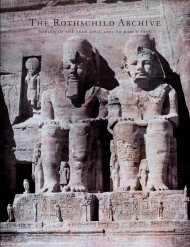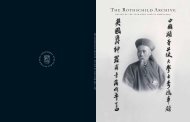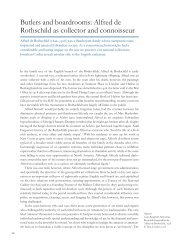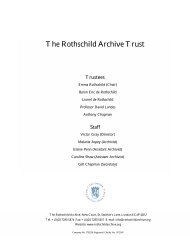Brothers-in-law: the Rothschilds and the Montefiores
Brothers-in-law: the Rothschilds and the Montefiores
Brothers-in-law: the Rothschilds and the Montefiores
Create successful ePaper yourself
Turn your PDF publications into a flip-book with our unique Google optimized e-Paper software.
<strong>Bro<strong>the</strong>rs</strong>-<strong>in</strong>-<strong>law</strong>:<br />
<strong>the</strong> <strong>Rothschilds</strong> <strong>and</strong> <strong>the</strong> <strong>Montefiores</strong><br />
Abigail Green shows how new sources shed light on <strong>the</strong> orig<strong>in</strong>s of<br />
<strong>the</strong> Montefiore-Rothschild connection.<br />
Moses Montefiore <strong>in</strong> old<br />
age, from an album of<br />
photographs belong<strong>in</strong>g to<br />
Emma, Lady Rothschild<br />
(1844–1935).<br />
Sir Moses Montefiore (1784–1885) was <strong>the</strong> preem<strong>in</strong>ent<br />
Jewish figure of <strong>the</strong> n<strong>in</strong>eteenth century –<br />
a humanitarian, philanthropist <strong>and</strong> campaigner for<br />
Jewish emancipation whose fame stretched from<br />
<strong>the</strong> Jewish settlement of Montefiore <strong>in</strong> Kansas to<br />
<strong>the</strong> ghettos of Eastern Europe <strong>and</strong> Morocco.<br />
Born <strong>in</strong>to London’s Sephardi elite, Montefiore<br />
made his fortune on <strong>the</strong> stock exchange <strong>and</strong><br />
retired at forty, a very wealthy man. For <strong>the</strong> next<br />
fifty years, he criss-crossed <strong>the</strong> globe <strong>in</strong> his efforts<br />
to improve <strong>the</strong> lot of n<strong>in</strong>eteenth century Jewry,<br />
oblivious to <strong>the</strong> dangers of piracy, cholera <strong>and</strong><br />
war, disregard<strong>in</strong>g his ever-greater age <strong>and</strong> physical<br />
<strong>in</strong>firmities. Operat<strong>in</strong>g as a k<strong>in</strong>d of unofficial<br />
ambassador for <strong>the</strong> Jewish people, Montefiore<br />
pioneered a diplomatic approach to <strong>the</strong> problem<br />
of Jewish persecution <strong>and</strong> helped to carve a new<br />
place for <strong>the</strong> Jews <strong>in</strong> <strong>the</strong> modern world.<br />
Montefiore was not just a bus<strong>in</strong>essman <strong>and</strong><br />
Jewish activist, he was also Nathan Rothschild’s<br />
bro<strong>the</strong>r-<strong>in</strong>-<strong>law</strong>. Arguably, <strong>in</strong>deed, <strong>the</strong> Rothschild<br />
connection came first. Money enabled philanthropy,<br />
<strong>and</strong> it has been generally accepted by historians that Montefiore’s marriage to Judith<br />
Cohen, <strong>the</strong> sister of Nathan’s wife Hannah, effectively made his fortune. Almost bankrupted <strong>in</strong><br />
1806 at an early stage <strong>in</strong> his career, Moses Montefiore is thought to have amassed perhaps half<br />
a million pounds thanks largely to his position as Nathan’s stock-broker. For a Jew like<br />
Montefiore, this wealth provided an <strong>in</strong>dispensable entrée <strong>in</strong>to <strong>the</strong> corridors of power.<br />
Montefiore’s bus<strong>in</strong>ess connections gave him ready access to lead<strong>in</strong>g politicians on all sides of<br />
<strong>the</strong> political spectrum, without which nei<strong>the</strong>r he, Nathan nor Isaac Lyon Goldsmid could have<br />
lobbied so actively for Jewish emancipation dur<strong>in</strong>g <strong>the</strong> 1830s. Abroad too, Montefiore’s ability<br />
to relieve his oppressed co-religionists owed almost as much to his well-publicised Rothschild<br />
connection as it did to <strong>the</strong> support of <strong>the</strong> British government. In 1840, when he travelled to<br />
Alex<strong>and</strong>ria <strong>and</strong> Constant<strong>in</strong>ople to refute allegations of ritual murder <strong>in</strong> Damascus, <strong>the</strong><br />
Ottoman Gr<strong>and</strong> Vizier described Montefiore as one of ‘<strong>the</strong> esteemed people of <strong>the</strong> Jewish millet<br />
[nation]’ <strong>and</strong> ‘a relative of <strong>the</strong> famous banker Rothschild’.¹ This was an important consideration<br />
given efforts to <strong>in</strong>volve both him <strong>and</strong> <strong>the</strong> <strong>Rothschilds</strong> <strong>in</strong> Ottoman f<strong>in</strong>ances. When<br />
Montefiore arrived <strong>in</strong> Morocco some twenty five years later, <strong>the</strong> dist<strong>in</strong>guished historian Ahmed<br />
Naciri recounted (quite erroneously) how <strong>the</strong> Jews of Morocco had appealed to Rothschild,<br />
‘<strong>the</strong> most considerable Jewish merchant <strong>in</strong> London’, who had <strong>the</strong>n ‘designated one of his <strong>in</strong><strong>law</strong>s<br />
to visit <strong>the</strong> Sultan (May God have mercy on him) <strong>and</strong> to deal with this matter (…)’.²<br />
15
New Court 1819. Nathan<br />
<strong>and</strong> Hannah Rothschild<br />
lived <strong>in</strong> number 2, on <strong>the</strong><br />
right <strong>in</strong> this watercolour<br />
image, with <strong>the</strong>ir<br />
Montefiore neighbours<br />
<strong>in</strong> number 4.<br />
opposite<br />
A plan of <strong>the</strong> Royal<br />
Exchange from 1760,<br />
show<strong>in</strong>g <strong>the</strong> pillars<br />
allocated to <strong>the</strong> various<br />
groups of traders.<br />
Nathan Rothschild by<br />
his customary pillar, <strong>in</strong><br />
‘The Royal Exchange –<br />
Tom po<strong>in</strong>t<strong>in</strong>g out to Jerry<br />
a few of <strong>the</strong> primest<br />
features of life <strong>in</strong> London’,<br />
Cruikshank.<br />
Despite <strong>the</strong> importance of <strong>the</strong> Montefiore-Rothschild connection, <strong>the</strong> relationship between<br />
Moses <strong>and</strong> Nathan has, until now, been more <strong>the</strong> stuff of myth than of properly researched<br />
history. Toge<strong>the</strong>r with material now available <strong>in</strong> <strong>the</strong> Oxford Centre for Hebrew <strong>and</strong> Jewish<br />
Studies, <strong>the</strong> Judendeutsch correspondence between Nathan <strong>and</strong> his bro<strong>the</strong>rs on <strong>the</strong> cont<strong>in</strong>ent<br />
– Amschel, Salomon, Carl <strong>and</strong> James – adds a new dimension to our underst<strong>and</strong><strong>in</strong>g of this<br />
relationship.<br />
It is important to note that Montefiore’s recovery from <strong>the</strong> disasters of his early f<strong>in</strong>ancial<br />
career probably owed less to his Rothschild connection than historians have previously thought.<br />
When Nathan applied to marry Hannah <strong>in</strong> 1806, her fa<strong>the</strong>r Levi Barent Cohen made certa<strong>in</strong><br />
that his future son-<strong>in</strong>-<strong>law</strong> owned at least £10,000, <strong>and</strong> <strong>in</strong>sisted on a thorough exam<strong>in</strong>ation of<br />
his books.³ Levi was dead by <strong>the</strong> time of Montefiore’s marriage <strong>in</strong> 1812, but Judith still brought<br />
him an <strong>in</strong>heritance of £3,200: her relatives would probably not have permitted <strong>the</strong> match if <strong>the</strong>y<br />
thought him a bad prospect.⁴ The membership records of <strong>the</strong> Spanish <strong>and</strong> Portuguese Jews’<br />
congregation bear out this <strong>in</strong>terpretation. By September 1811 Montefiore was already pay<strong>in</strong>g an<br />
<strong>in</strong>come-related membership fee of £3 3s 4d, known as f<strong>in</strong>ta. This placed him <strong>in</strong> <strong>the</strong> upper half<br />
of f<strong>in</strong>ta-pay<strong>in</strong>g members roughly a year before his marriage.⁵<br />
Undoubtedly, however, <strong>the</strong> relationship with Nathan made a difference. The two men were<br />
contrast<strong>in</strong>g characters. Where Nathan was famously slapdash, Montefiore was meticulous.<br />
Where Nathan was dar<strong>in</strong>g, imag<strong>in</strong>ative <strong>and</strong> risky, Montefiore was <strong>in</strong>st<strong>in</strong>ctively cautious. While<br />
Nathan was a workaholic, Montefiore found time to jo<strong>in</strong> <strong>the</strong> Surrey Militia, take lessons <strong>in</strong> <strong>the</strong><br />
bugle, play cards, learn French, <strong>and</strong> read <strong>the</strong> Classics. Despite – maybe because – of <strong>the</strong>ir differences,<br />
Nathan <strong>and</strong> Montefiore hit it off immediately. Shortly after <strong>the</strong>ir marriage, <strong>the</strong><br />
<strong>Montefiores</strong> moved to 4 New Court, St. Swith<strong>in</strong>’s Lane, where <strong>the</strong>y lived next door to Nathan<br />
<strong>and</strong> Hannah.⁶ Not long after this move to New Court, Montefiore began to benefit very substantially<br />
from Nathan’s f<strong>in</strong>ancial expertise – for which he was deeply grateful. On 31st August<br />
1813, he added a codicil to his will giv<strong>in</strong>g Nathan <strong>and</strong> Hannah Rothschild, five pounds each for<br />
a r<strong>in</strong>g <strong>and</strong> ‘entreat<strong>in</strong>g <strong>the</strong>m to cont<strong>in</strong>ue to my dear Judith <strong>the</strong> friendship & regard, <strong>the</strong>y have so<br />
k<strong>in</strong>dly favoured us with; this is my last & most earnest wish’.⁷ Apart from Judith, his mo<strong>the</strong>r<br />
16
Rachel <strong>and</strong> his bro<strong>the</strong>r Abraham, <strong>the</strong>y were <strong>the</strong> only personal beneficiaries.<br />
By 1814, Nathan was allow<strong>in</strong>g Montefiore to become even more closely <strong>in</strong>volved <strong>in</strong> his<br />
affairs. In addition to <strong>the</strong>ir direct <strong>in</strong>volvement <strong>in</strong> Brita<strong>in</strong>’s subsidies to her cont<strong>in</strong>ental allies, <strong>the</strong><br />
<strong>Rothschilds</strong> sought to profit <strong>in</strong>directly by speculat<strong>in</strong>g on <strong>the</strong> fluctuations <strong>in</strong> bond prices.⁸<br />
Russian bonds began to rise <strong>in</strong> 1814 as an Allied victory seemed <strong>in</strong>creas<strong>in</strong>gly likely, but with <strong>the</strong><br />
outcome still uncerta<strong>in</strong>, it made sense to try <strong>and</strong> buy <strong>the</strong>m cheaply if you thought <strong>the</strong> Allies<br />
were likely to w<strong>in</strong>. With this <strong>in</strong> m<strong>in</strong>d, Nathan sent Montefiore to Paris <strong>in</strong> March 1814 to stay<br />
with his bro<strong>the</strong>rs James <strong>and</strong> Salomon de Rothschild shortly before Napoleon’s first abdication.<br />
But Montefiore was too late. He reported that Russian Paper (bonds), which was 90 when he<br />
arrived, had now risen to 100. He would buy £2000 worth if <strong>the</strong> price dropped aga<strong>in</strong> to 90, but<br />
was unenthusiastic at <strong>the</strong> prospect, conclud<strong>in</strong>g: ‘alas, this is all I can say with respect to <strong>the</strong><br />
object of my excursion to this City.’⁹<br />
As Nathan’s close associate <strong>and</strong> neighbour, Montefiore also found himself at <strong>the</strong> heart of<br />
<strong>the</strong> thrill<strong>in</strong>g events of 1815. He never tired of recall<strong>in</strong>g <strong>the</strong> day when his bro<strong>the</strong>r-<strong>in</strong>-<strong>law</strong> woke<br />
him at five <strong>in</strong> <strong>the</strong> morn<strong>in</strong>g with <strong>the</strong> news that Napoleon had escaped from Elba.¹⁰ ‘Hastily<br />
dress<strong>in</strong>g himself, he received <strong>in</strong>structions what sales to effect on <strong>the</strong> Exchange, <strong>and</strong> <strong>the</strong>n Mr.<br />
Rothschild went to communicate his <strong>in</strong>formation to <strong>the</strong> M<strong>in</strong>istry.’ More prosaically, Montefiore<br />
derived substantial benefits from act<strong>in</strong>g as Nathan’s broker. In 1816, for <strong>in</strong>stance, Montefiore<br />
<strong>Bro<strong>the</strong>rs</strong> sold £150,000 <strong>in</strong> Exchequer Bills received by Nathan from John Herries, Commissary<br />
<strong>in</strong> Chief of <strong>the</strong> British Government.¹¹ Montefiore had f<strong>in</strong>ally purchased his Broker’s Medal <strong>in</strong><br />
1815, <strong>and</strong> on all this bus<strong>in</strong>ess he would have received <strong>the</strong> customary commission of ⅛%.<br />
Indeed, Nathan’s bro<strong>the</strong>rs worried that he was too generous <strong>in</strong> <strong>the</strong> terms on which he did bus<strong>in</strong>ess<br />
with <strong>the</strong> <strong>Montefiores</strong>. In a letter dated August 1816, Nathan’s youngest bro<strong>the</strong>r James<br />
wrote him from Paris: ‘I note with great satisfaction that you have bought £400,000 stocks, but<br />
tell me, are you gett<strong>in</strong>g commission on it <strong>and</strong>, if not, where is your profit? That is <strong>the</strong> most<br />
important th<strong>in</strong>g. Or are you work<strong>in</strong>g for Montefiore?’¹²<br />
Commission was always welcome to a broker like Montefiore, but he must have found<br />
Nathan’s government contacts at least equally useful. Act<strong>in</strong>g on Herries’ advice <strong>in</strong> 1816, Nathan<br />
<strong>in</strong>vested almost all <strong>the</strong> firm’s capital <strong>in</strong> 3% consols – a form of perpetual government bond –<br />
at prices of about 65.1 <strong>and</strong> 61.5, which enabled him to make a profit of £250,000 when <strong>the</strong>y<br />
rose above 82 after July 1817.¹³ It seems almost certa<strong>in</strong> that Montefiore profited from this excellent<br />
tip. James for one thought that Nathan was too <strong>in</strong>discreet when deal<strong>in</strong>g with his London<br />
associates: ‘[e]veryone is say<strong>in</strong>g to me, “you are be<strong>in</strong>g secretive <strong>and</strong> your bro<strong>the</strong>r tells everyth<strong>in</strong>g<br />
to those who want to hear him.” Please, dear Nathan, if you send me a courier with an offer [of<br />
stock] <strong>the</strong>n at least don’t tell everybody about it’.¹⁴ It is tell<strong>in</strong>g that both Montefiore <strong>and</strong> his<br />
bro<strong>the</strong>r <strong>and</strong> bus<strong>in</strong>ess partner Abraham became seriously rich dur<strong>in</strong>g precisely this period. In<br />
September 1815, Moses was assessed to pay f<strong>in</strong>ta of £8 13s 4d to <strong>the</strong> Spanish <strong>and</strong> Portuguese<br />
Synagogue, <strong>and</strong> Abraham to pay £8 10s. This was steep, but not yet top of <strong>the</strong> range. By 1819,<br />
however, Moses was pay<strong>in</strong>g a very high f<strong>in</strong>ta of £25 <strong>and</strong> Abraham £23 6s 8d, plac<strong>in</strong>g <strong>the</strong>m<br />
among <strong>the</strong> very wealthiest of <strong>the</strong> Sephardi elite.¹⁵<br />
The years between 1815 <strong>and</strong> 1817 proved decisive for <strong>the</strong> relationship between Nathan <strong>and</strong><br />
<strong>the</strong> Montefiore bro<strong>the</strong>rs. On 23rd August 1815, Abraham married Nathan’s sister Henrietta,<br />
<strong>the</strong>reby streng<strong>the</strong>n<strong>in</strong>g <strong>the</strong> connection. Abraham was a remarkably driven man with a real<br />
appetite <strong>and</strong> talent for bus<strong>in</strong>ess. As late as 1823, when Abraham’s energies were already underm<strong>in</strong>ed<br />
by ill-health, his mo<strong>the</strong>r Rachel compla<strong>in</strong>ed that she had not seen her son for some time,<br />
‘such a house of Bus<strong>in</strong>ess as he is <strong>in</strong> where every room is occupied with it I cannot but th<strong>in</strong>k<br />
<strong>the</strong> visits of an Old Woman must be <strong>in</strong>trud<strong>in</strong>g’.¹⁶ Henrietta was an equally strong character; she<br />
<strong>and</strong> <strong>the</strong> grasp<strong>in</strong>g Abraham proved a well-matched pair. In 1817, for <strong>in</strong>stance, Salomon compla<strong>in</strong>ed<br />
that his sister <strong>and</strong> her husb<strong>and</strong> were too mean to ‘sacrifice a shill<strong>in</strong>g <strong>and</strong> to offer her<br />
bro<strong>the</strong>r a piece of blackened glass for <strong>the</strong> occasion of <strong>the</strong> eclipse of <strong>the</strong> sun’.¹⁷<br />
An undated letter <strong>in</strong><br />
Judendeutsch, c.1816, from<br />
Henrietta Montefiore to<br />
her bro<strong>the</strong>r, Nathan<br />
Rothschild, concern<strong>in</strong>g<br />
her stock purchases.<br />
Henrietta, née Rothschild,<br />
<strong>the</strong> wife of Abraham<br />
Montefiore.<br />
18
20<br />
When Henrietta <strong>and</strong> Abraham visited Paris <strong>in</strong> <strong>the</strong> spr<strong>in</strong>g of that year, <strong>the</strong>y were <strong>in</strong>tent on<br />
muscl<strong>in</strong>g <strong>in</strong> on Rothschild bus<strong>in</strong>ess operations. This put James’ nose out of jo<strong>in</strong>t. ‘I paid<br />
Montefiore all due respect <strong>and</strong> attention,’ he compla<strong>in</strong>ed to Nathan, ‘but unfortunately I did not<br />
give him millions <strong>and</strong>, worse still, I did not talk to him about rentes, for how could I possibly<br />
know that this man had come here <strong>in</strong> order to make a spec as <strong>the</strong>y say now? I had no idea at all<br />
<strong>and</strong> I thought all along he had come to Paris to amuse himself ’.¹⁸<br />
James had no objection to us<strong>in</strong>g Abraham as a broker, but advised Nathan not to <strong>in</strong>volve<br />
his bro<strong>the</strong>rs-<strong>in</strong>-<strong>law</strong> <strong>in</strong> <strong>the</strong> rest of his affairs. If Nathan stuck to do<strong>in</strong>g bus<strong>in</strong>ess with his blood<br />
family, James told him, ‘you will soon f<strong>in</strong>d out who your friends really are, because as soon as<br />
<strong>the</strong> arse lickers see <strong>the</strong>re is noth<strong>in</strong>g more to ga<strong>in</strong>, <strong>the</strong>y will fall away like blood suckers when <strong>the</strong>y<br />
have drunk too much blood.’ Six months later, Abraham’s disastrous visit to Paris cont<strong>in</strong>ued to<br />
rankle. ‘You write that when [Abraham Montefiore] is rich enough, with God’s help, you will be<br />
thanked [but I say] your children are more likely to be given a glass of water’, James wrote to<br />
Nathan that December.¹⁹ He signed off ‘with good wishes from your lov<strong>in</strong>g bro<strong>the</strong>r who, like<br />
all bro<strong>the</strong>rs, is <strong>the</strong> one person you can rely on <strong>and</strong> whose loyalty <strong>and</strong> righteousness is more<br />
proven than that of a bro<strong>the</strong>r-<strong>in</strong>-<strong>law</strong> already count<strong>in</strong>g on our bro<strong>the</strong>r Amschel’s <strong>in</strong>heritance <strong>and</strong><br />
work<strong>in</strong>g out <strong>the</strong> quickest way to jo<strong>in</strong> us.’<br />
To some extent this was part of a wider problem. Nathan’s bro<strong>the</strong>rs undoubtedly resented<br />
members of <strong>the</strong>ir extended family <strong>in</strong> London for seek<strong>in</strong>g to <strong>in</strong>terfere <strong>in</strong> family affairs. Writ<strong>in</strong>g<br />
from Amsterdam to his bro<strong>the</strong>rs James <strong>and</strong> Salomon <strong>in</strong> Paris, Carl von Rothschild compla<strong>in</strong>ed:<br />
‘Nathan was on his own for too long <strong>and</strong> has attached himself too closely to o<strong>the</strong>rs (…)’.²⁰ In<br />
1817, James was <strong>the</strong>refore delighted to hear from Salomon that he ‘did not know London any<br />
more.²¹ Not only that people like [Abraham] Montefiore <strong>and</strong> Salomon Cohen are no longer discuss<strong>in</strong>g<br />
<strong>the</strong> letters, but that not even [Meyer] Davidson is gett<strong>in</strong>g <strong>the</strong>m any more’. All this <strong>in</strong>dicates<br />
that 1817 was someth<strong>in</strong>g of a turn<strong>in</strong>g po<strong>in</strong>t <strong>in</strong> Nathan Rothschild’s bus<strong>in</strong>ess practice – a<br />
year <strong>in</strong> which he decided to focus on <strong>the</strong> family firm at <strong>the</strong> expense of his new London relatives.<br />
Moses Montefiore appears to have been more circumspect than <strong>the</strong> o<strong>the</strong>r Rothschild bro<strong>the</strong>rs-<strong>in</strong>-<strong>law</strong>.<br />
Indeed, Salomon went out of his way to describe Moses as ‘a fundamentally honest,<br />
f<strong>in</strong>e man’.²² The fact that Moses <strong>and</strong> Abraham had dissolved <strong>the</strong>ir partnership <strong>in</strong> November<br />
1816 may have distanced him from his younger bro<strong>the</strong>r’s ill-judged activities.²³ An often quoted<br />
letter written <strong>in</strong> early 1818 suggests that Nathan <strong>and</strong> Moses rema<strong>in</strong>ed on very friendly terms. ‘I<br />
am very happy to learn you make as good a Bear as you formerly did a Bull,’ he wrote to his<br />
bro<strong>the</strong>r-<strong>in</strong>-<strong>law</strong> Rothschild. ‘[Y]ou must have had some difficulty with my bro<strong>the</strong>r Abraham,<br />
<strong>in</strong>deed it is quite a new character for both, it has one great advantage that while Consoles cont<strong>in</strong>ue<br />
at or above 82 <strong>the</strong>re can be very little to fear, you have beat your antagonists so frequently<br />
that I am surprised <strong>the</strong>re are any to be found <strong>in</strong> <strong>the</strong> Stock Exchange to oppose you <strong>in</strong> any considerable<br />
operation.²⁴ Retrospectively, however, <strong>the</strong> impact of Abraham’s behaviour appeared<br />
little short of disastrous. When Rothschild died <strong>in</strong> 1836, Montefiore wrote bitterly: ‘NMR was<br />
a great & honored friend to Jud & I until Henrietta arrived <strong>in</strong> Engl<strong>and</strong> & married Abraham.<br />
They may God forgive <strong>the</strong>m destroyed <strong>the</strong> k<strong>in</strong>d feel<strong>in</strong>g which preceed<strong>in</strong>gly subsisted’.²⁵<br />
This was, of course, an exaggeration. Montefiore <strong>and</strong> Nathan rema<strong>in</strong>ed associates throughout<br />
<strong>the</strong> 1820s, famously found<strong>in</strong>g <strong>the</strong> Alliance Assurance company toge<strong>the</strong>r <strong>in</strong> 1824. Abraham<br />
died young, but his descendants would marry <strong>in</strong>to <strong>the</strong> Rothschild family for several generations.<br />
Montefiore <strong>and</strong> Judith rema<strong>in</strong>ed friendly with Nathan <strong>and</strong> Hannah, host<strong>in</strong>g <strong>the</strong> Rothschild children<br />
at <strong>the</strong>ir home <strong>in</strong> Ramsgate <strong>and</strong> attend<strong>in</strong>g <strong>the</strong> marriage of Lionel <strong>and</strong> Charlotte <strong>in</strong> Frankfurt<br />
just before Nathan’s untimely death. As a member of <strong>the</strong> Spanish <strong>and</strong> Portuguese Jews’ burial<br />
society, it fell to Montefiore to watch over Nathan’s body as it was transported back to his<br />
London home. Family ties rema<strong>in</strong>ed warm, but <strong>in</strong> matters of bus<strong>in</strong>ess Montefiore was no<br />
longer a member of Nathan’s <strong>in</strong>ner circle. Where once this had <strong>in</strong>cluded his London bro<strong>the</strong>rs-
<strong>in</strong>-<strong>law</strong> – not just Moses <strong>and</strong> Abraham but also Meyer Davidson <strong>and</strong> Salomon Cohen – now, he<br />
<strong>and</strong> his four cont<strong>in</strong>ental bro<strong>the</strong>rs preferred to manage <strong>the</strong>ir bus<strong>in</strong>ess from beh<strong>in</strong>d closed doors.<br />
Dr Abigail Green is a Fellow of Brasenose College Oxford. She has written on regionalism <strong>and</strong> state<br />
formation <strong>in</strong> n<strong>in</strong>eteenth century Germany, <strong>and</strong> is currently focus<strong>in</strong>g on <strong>in</strong>ternational Jewish history,<br />
humanitarian philanthropy <strong>and</strong> religious <strong>in</strong>ternationalism. Her biography of Moses Montefiore will be<br />
published <strong>in</strong> March 2010 by Harvard University Press as Moses Montefiore: Jewish Liberator,<br />
Imperial Hero.<br />
bibliography<br />
‘Gr<strong>and</strong> Vizerial Note, Address<strong>in</strong>g <strong>the</strong> Chief Secretary<br />
at <strong>the</strong> Imperial Palace, <strong>and</strong> Request<strong>in</strong>g an Imperial<br />
Comm<strong>and</strong>.’ Irade-Mesail-i Mühimme 1005/1.<br />
Ottoman Archives, M<strong>in</strong>istry of Foreign Affairs<br />
Archive, 1840.<br />
Kaplan, Herbert H. Nathan Mayer Rothschild <strong>and</strong> <strong>the</strong><br />
Creation of a Dynasty. The Critical Years 1806–1816.<br />
Stanford, California: Stanford University Press,<br />
2006.<br />
Naciri, Ahmed. Al Istiqsa Li Akhbar Duwwal Al Maghrib<br />
Al Aqsa. Casablanca: Dar Al Kitab, 1956.<br />
‘Will of Levy Barent Cohen, 17 June 1808.’<br />
Prob/11/1480. The National Archives, 1808.<br />
Wolf, Lucien. Sir Moses Montefiore. A Centennial Biography,<br />
with Extracts from Letters <strong>and</strong> Journals. London: John<br />
Murray, 1884.<br />
notes<br />
1 ‘Gr<strong>and</strong> Vizerial Note, Address<strong>in</strong>g <strong>the</strong> Chief<br />
Secretary at <strong>the</strong> Imperial Palace, <strong>and</strong> Request<strong>in</strong>g an<br />
Imperial Comm<strong>and</strong>’, Irade-Mesail-i Mühimme<br />
1005/1, Ottoman Archives, M<strong>in</strong>istry of Foreign<br />
Affairs Archive (1840).<br />
2 Ahmed Naciri, Al Istiqsa Li Akhbar Duwwal Al<br />
Maghrib Al Aqsa (Casablanca: Dar Al Kitab, 1956),<br />
112–15.<br />
3 Lucien Wolf, Sir Moses Montefiore. A Centennial<br />
Biography, with Extracts from Letters <strong>and</strong> Journals<br />
(London: John Murray, 1884), 21.<br />
4 ‘Will of Levy Barent Cohen, 17 June 1808’,<br />
Prob/11/1480, The National Archives (1808). More<br />
generally see Herbert H. Kaplan, Nathan Mayer<br />
Rothschild <strong>and</strong> <strong>the</strong> Creation of a Dynasty. The Critical<br />
Years 1806–1816 (Stanford, California: Stanford<br />
University Press, 2006), 6–10.<br />
5 List of F<strong>in</strong>ta Payments for <strong>the</strong> Follow<strong>in</strong>g Three<br />
Years: Aug. 28, 1806, Aug. 24, 1809, MB Mahamad,<br />
Kislev 5563‒1802 to Nisan 5571‒1811, ms109, uncat<br />
b07/085, ff.149‒153, 278‒282; Sept. 3, 1811 MB of<br />
<strong>the</strong> Mahamad, Kislev 5571‒1811 to Elul 5578‒1818,<br />
ms110, uncat b07/085, ff.15‒20, Records of <strong>the</strong><br />
Spanish & Portuguese Jews’ Congregation (S&P),<br />
London Metropolitan Archive (LMA).<br />
6 Louis Loewe, ed., Diaries of Sir Moses <strong>and</strong> Lady<br />
Montefiore, Compris<strong>in</strong>g Their Life <strong>and</strong> Work as Recorded<br />
<strong>in</strong> Their Diaries from 1812 to 1883, vol.1 (London:<br />
Griffith Farran Okeden & Welsh, 1890), 18.<br />
7 Small Brown Book start<strong>in</strong>g with MM’s Will, Ellul 5,<br />
5573, Arthur Sebag-Montefiore Archive (ASM),<br />
Oxford Centre for Hebrew <strong>and</strong> Jewish Studies.<br />
8 See Kaplan, Rothschild, chap. 5.<br />
9 MM to Nathan Rothschild, 9 March 1814, Folder 1,<br />
Hartley Library, University of Southampton (HL).<br />
10 Wolf, Montefiore, 23‒24.<br />
11 Certificate of Attestation, February 1816[?], issued<br />
by Montefiore <strong>Bro<strong>the</strong>rs</strong> & Jo & Geo Van Sommer.<br />
Herries Papers, Add. 57380 f.70, British Library<br />
(BL).<br />
12 James to Nathan <strong>and</strong> Salomon, 17 August 1816,<br />
ral xi/109/5/2/130.<br />
13 Ferguson, World’s Banker, 126‒129.<br />
14 James to Nathan <strong>and</strong> Salomon, 17 August 1816,<br />
ral xi/109/5/2/130.<br />
15 List of F<strong>in</strong>ta Payments for <strong>the</strong> Follow<strong>in</strong>g Three<br />
Years: 19 September 1815, MB Mahamad, Kislev<br />
5571‒1811 to Elul 5578‒1818, ms110, uncat<br />
b07/085, ff.176‒179, S&P, LMA.<br />
16 Rachel Montefiore, 18 March 1823, to MM <strong>and</strong> JM,<br />
ASM.<br />
17 Salomon <strong>and</strong> James to Nathan, 19 May 1817,<br />
ral xi/t27/256.<br />
18 James to Nathan, 19 May 1817, ral xi/109/7.<br />
19 Salomon, PS from James to Nathan, 29 December<br />
1817, ral xi/109/8/2/134.<br />
20 Carl to Salomon <strong>and</strong> James, 11 November 1815<br />
ral xi/109/3/1/48.<br />
21 James to Nathan, 19 May 1817, ral xi/109/7/1/45.<br />
22 Cited after Lipman, ‘Victorian Gentleman’, 14.<br />
23 LD, 1, 21.<br />
24 MM to Nathan, 10 February 1818, Folder 1, HL.<br />
25 August 8, 1836, Loose leaf, MMJ, ASM.<br />
21



